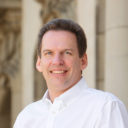Balancing with Jeff
Astrophysicist Jeff Zweerink stands out from the other Reasons To Believe scholars—not only because he’s several inches taller (at 6’4″), but also because he’s still directly active in research. Working as a part-time research faculty member at UCLA in addition to serving at RTB gives Jeff the opportunity to integrate professional research and ministry in a unique way. But work isn’t the only balancing act in Jeff’s life. With five young, active kids, Jeff also finds ways to put family first.
MB: How did you get involved with RTB?
JZ: My first contact with RTB was back in the late 1980s when I heard Hugh Ross speak at Iowa State University. It was the first time I realized it was possible to do professional work incorporating both my love of science and my desire to serve God. After speaking with Hugh privately, I decided to pick up an astronomy emphasis with my physics major and ultimately earned a PhD in astrophysics.
The next encounter came nearly 10 years later when I was a post-doc at the University of California, Riverside. My major professor suggested I enroll in a volunteer apologist program with a ministry headquartered near Pasadena. That ministry was RTB. I completed the training in 1999.
MB: What kind of research do you do at UCLA?
JZ: Until recently, my research focused on building telescopes to detect gamma rays from astrophysical objects. Gamma rays are just like visible light except they have much higher energy. Lately, I’ve been working on a balloon experiment to detect dark matter interactions. We know dark matter makes up a large fraction of the universe but we don’t know what it is. If our experiment meets its goal, it will provide valuable insight into dark matter’s nature and composition.
MB: How does your faith affect your work at UCLA, and vice versa?
JZ: They complement one another. My faith encourages me to understand this creation the best I can. My research continually affirms my belief that the Bible accurately describes this universe. As I gain a better understanding, it also deepens my worship of God as I see the intricacy and care with which He created.
MB: Please explain why you often focus on multiverse theory in your work for RTB.
JZ: This focus arose from seeing the theory’s growing popularity in the scientific literature. In my experience, it seemed Christians viewed the multiverse as a genuine threat to their faith (or at least to apologetic arguments). As I studied more, it occurred to me that the real “opponent” of Christianity is naturalism, not “evolution” or “multiverse” per se. I want to provide a more sophisticated response that seeks to understand how multiverse models actually impact scientific apologetics.
MB: Do you have any advice for people trying to balance work, ministry, and home life?
JZ: I appreciate RTB’s recognition that family is important. My wife and family see RTB as something they are all a part of. Otherwise, the traveling and long hours could be seen as obstacles to how our family operates. I stay involved with my kids’ activities and we eat dinner together most nights. As important as RTB’s ministry is, I believe God says my first responsibility is to shepherd my family.






